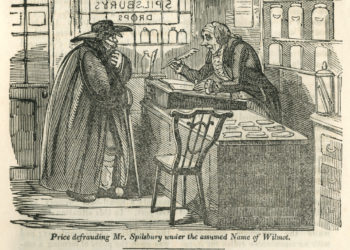Hopefully most of our readers are familiar with the television program Mythbusters — if not, I envy you for the many hours of enjoyable viewing you have ahead of you. On the show, Adam Savage and Jamie Hyneman tested the validity of rumors, myths, movie scenes, adages, Internet videos, and news stories. Though the show has ended, Savage continues to answer viewer questions, and here he tackles an interesting one about how they approached testing ideas that “had no basis in science.”
As Savage explains in the video below, the phrase “no basis in science” is meaningless, as science is not a compendium of knowledge, but rather a process we can use to help understand the truth. It’s a good reminder in an age where science is being both lauded and delegitimized. It’s also interesting to hear how they were able to break down big, seemingly unapproachable questions into testable propositions.
Discussion
4 Thoughts on "Science Is A Process"
This is a bit of a tangent David, but if readers are interested in learning more about how this whole philosophy of questioning “facts” originated, I highly recommend reading David Wootton’s “The Invention of Science” (https://amzn.to/31iUXAQ).
We haven’t always sought out facts. Indeed, the word “facts” itself is a rather recent invention, borrowed from English law. Similarly, the words “science” and “discovery” are also only around 350 years old. Until the era of Tycho Brahe, Copernicus, Columbus and Galileo, learned society was content to believe that all knowledge was known, just waiting to be rediscovered (in line with the philosophy and teachings of Aristotle, the ancients knew everything and it was up to “modern” scholars to “rediscover” these truths). Hence, our observations and explanations about the universe needed to conform with what must be true.
Starting around the mid-1500s and continuing until the mid-1700s, rebel philosophers began questioning this framework and compiling, bit by bit, evidence for alternate explanations of the world around us. There were, of course, people in history who made contributions to “science” in other parts of the world and at other times, but it was this concentrated push in 16th Century Europe that fundamentally changed our approach to thinking about the world and laid the foundation for the process we recognize today as “science.”
I think we sometimes take it for granted that we are able to question the world in this way—it’s a very recent addition to the human psyche, and maybe even one that hasn’t really taken root yet (as evidenced by polls over the last 50 years showing how only about 45% of the American public has “a great deal” of faith in science; these numbers track differently around the world). In the meantime, I do think we’re intrigued by science—we try to apply it to everything (most often incorrectly) and realize as a society how much we need science, now more than ever. But most people don’t understand exactly what the scientific process is, how it works, how it fits in with their religious beliefs, and so on. It’s a fascinating exploration. Watching Mythbusters is a fun start though!
Another annoying and commonly used phrase is “faith in science.” While the use of the word “faith” may be interpreted differently, when science deniers use this word, they imply that science is simply one more faith among many. When scientists use it, I cringe!
That’s a very interesting point—implying a false equivalency between having faith in teachings about the unknowable and faith in a process to discover truths about the natural world. It’s like saying we should have faith in the gravitational constant. Maybe what we mean is that we should “trust the process,” rather than “have faith in what scientists are telling you?”
Speaking of faith, I spoke incorrectly about the faith in science polling question. This is the data collected by CSS and regularly published by Pew. The actual question (asked since 1973) measures or “confidence in public institutions.” The institutions measured include “the scientific community,” along with the military, the supreme court, organized religion, the press, and more (see https://gssdataexplorer.norc.org/projects/95844/crosstabs/155711). Confidence in “the scientific community” in this poll has ranked second only to the military over the years, so it’s not bad, but this isn’t the same thing as “faith in science”—a shorthand translation that may not be accurate (for example, we often like our congressional representative but dislike Congress, politics, and policies).
Personally, I very enjoy David’s weekend program ( short paper) , which is not only fascinating, humorous, but also hot issues in the publishing industry, like it, thanks.



